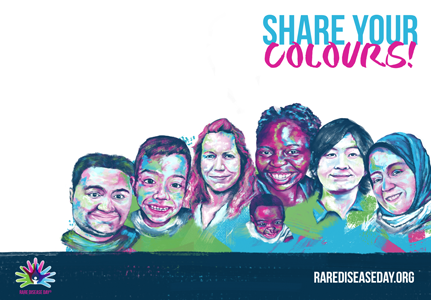Rare Diseases in the global spotlight on 28 February
February 2022
“I’ve dedicated myself to this fight so that all patients […] get access to treatment and innovative therapy. I want to ensure they have help to solve the problems they face and someone to listen to them and advise them,” – Jelena, Rare Disease Day hero from Serbia
On this Rare Disease Day, 28 February, over 100 countries and regions around the world will join their voices to raise awareness and generate change for the 300 million people with rare diseases, their families, and carers.
Though the campaign is community-led, everyone, including individuals, families, caregivers, healthcare professionals, researchers, clinicians, policymakers, industry representatives and the general public can participate in raising awareness and taking action for this vulnerable population who require immediate and urgent attention.
Needless to say, Rare Disease Day does not go unnoticed: the hashtag #RareDiseaseDay has traditionally trended on social media in the lead up to the actual celebration, reaching millions of people, and dozens of the world’s landmark monuments are lit in pink, green, blue, and purple, the Rare Disease Day colours, to show solidarity with the 300 million people with rare diseases worldwide and the 30 million living in Europe.
Additionally, this year’s Rare Disease Day will see two milestone policy events – the 2022 Global Rare Disease Day event in Dubai and streamed online, and the Ministerial Conference on Research and Care Pathways in Paris – that will define the next decade of rare disease policy and look to build Europe into a place where every person living with a rare disease can live a longer, better life.
“I just want to live just like other healthy people, even though I have a lot of limitations and there is no cure. Life is not just about surviving, but about loving, living and enjoying it,” – Pavla, Czech Republic
Organised by the NGO Committee for Rare Diseases with the support of the Swedish Government, and its co-founding organisations, Agrenska, Rare Diseases International and EURORDIS-Rare Diseases Europe, the 2022 Global Rare Disease Day event will be the first public opportunity to celebrate the adoption in December 2021 of the first-ever United Nations Resolution on Addressing the Challenges of Persons Living with a Rare Disease and their Families. It will also explore ways to increase international collaboration and synergies to make rare diseases a policy priority at all levels.
“We need to ignite curiosity and build awareness among scientists. Then inspiration will follow and pave the way to rare disease research and diagnosis,” – Gulcin, Spain
The Ministerial Conference on “Research and Care Pathways: For a European policy on rare diseases”, organised by the French Ministry for Solidarity and Health, will put forward recommendations to further develop European regulations concerning rare diseases. It will provide the occasion to define the EU roadmap for this matter and to collectively prepare to implement a European plan for rare diseases, for which we have been advocating together for months now. If adopted, this plan would bring together all relevant policy areas and initiatives within rare diseases – from diagnosis to research to data to treatments to care to social inclusion – in a common strategy that connects European countries.
Now is the time to come together to advocate for more research, better treatments and improved quality of life for all people with rare diseases.
How to get involved?
- Participate in the Global Chain of Lights: Share your colours by lighting or decorating your home with the Rare Disease Day colours, ideally at 7 pm wherever you live
- Organise your own or take part in existing events in your community
- Share your story of life with a rare disease, as part of the Share Your Colours storytelling initiative
- Register to attend online or in-person the 2022 Global Rare Disease Day event
- Share digital materials prepared just for you on your social media, and
- Become a friend of Rare Disease Day (for organisations only)
Stanislav Ostapenko, Communications Manager, EURORDIS
